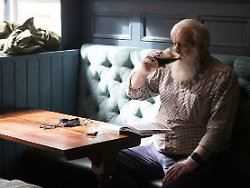Saturday, December 25, 2021
The slow dying of the pubs
British pubs are struggling to survive
Whether for a pint after work, for the traditional Sunday Roast on the weekend or for Christmas with the family: the pub around the corner is a social hub for many Brits. But the industry is going through a tough time – with an uncertain future.
They are beloved by locals and tourists alike, but that alone is not enough to survive: Many of the traditional British pubs have been hard hit by the pandemic and Brexit. You have been through an odyssey, the outcome of which is still unclear. But it is already clear today that not all of them have survived the marathon of lockdowns and partial openings.
The management consultancy AlixPartners found out on the basis of a database of the licensed companies in Great Britain: The number of pubs has decreased by 8.6 percent since the outbreak of the pandemic up to September this year, around 9,900 companies had to give up. On average, 550 pubs closed their doors for good every month. Especially independent pubs that weren’t part of larger chains had a hard time – as did pubs in Birmingham, Nottingham and Edinburgh, whose pub scene was hit harder than the average.
“These numbers are a powerful reminder that the removal of all restrictions in July will not mark the end of the challenges,” said Graeme Smith of AlixPartners. In the summer there were additional problems such as a shortage of workers, which made it difficult for the pubs to quickly get their business going again.
Brexit means there is a shortage of workers
The lack of workers is not only due to the fact that many changed industries during the month-long Corona closings. Brexit also plays a role: For decades, many workers in the service sector came from the EU, stayed for a short time or even for years. This is no longer so easy: because in order to start a job as an EU citizen in Great Britain, complex and expensive visa procedures are necessary, which only very few employers sponsor. This even prompted the founder of the widespread pub chain Wetherspoon, Tim Martin, who was actually a staunch Brexiteer, to demand simplified rules for European workers.
The full extent of pub dying is unlikely to become apparent until next year. The so-called Furlough program – the British version of short-time work – served as a support for many companies until autumn. But the burden of the pandemic remains – and the Omikron variant brings new uncertainty. “December is a crucial month for our industry,” said a spokesman for the British Beer and Pub Association. But Omikron left many doubts on the sociable evening in the pub. “In many companies, the Christmas parties have been canceled or significantly reduced.”
For some guests, this may also be due to the fact that not very much is currently being done in British pubs to prevent corona outbreaks. The British do not want to know anything about 3G or even 2G and similar obligations to provide evidence in the catering industry and the recently tightened mask requirement still does not apply in pubs or restaurants.
The pint gets more expensive
The British Pub Association assures that pubs are still safe places, but at the same time admits: “Fewer people come to the pub when Corona measures such as masks, vaccination certificates and other apply.” Shortly before Christmas, the Treasury Department put together an emergency aid package, which some described as “vital” and others as a drop in the ocean.
How many other pubs will fall victim to the crisis will also depend on how the pandemic develops and how the British government deals with it. The British thirst for beer, on the other hand, is likely to persist – as in the spring of this year when, after a few days of open beer gardens, the kegs in the pubs already ran empty due to the large crowd. However, the British may have to dig deeper into their pockets next year.
The price of a pint could rise significantly after the crisis, warned some pub owners. Higher prices could therefore put the British love for their pubs to the test in the future. How far this can go, however, became apparent recently when the guests of a pub in the north of England had to stay there for days due to a snow storm. The streets around the pub were snowed up and the pub cut off from the outside world. It is now clear: love lasts. “It was like a party with a large group of friends,” said the landlady of the Tan Hill Inn after dozens of guests were finally able to go home. The group is already planning to meet again next year.
